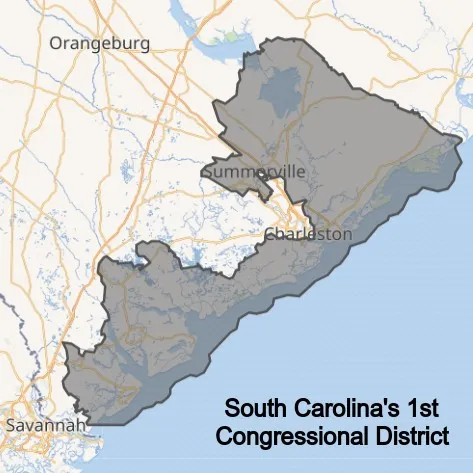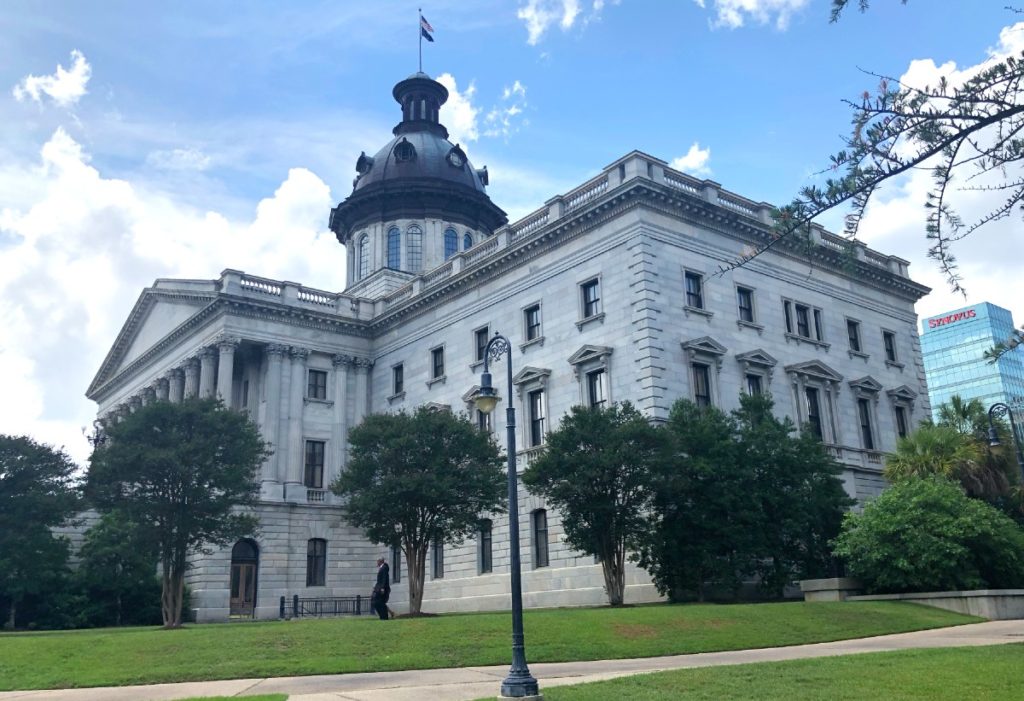STATEHOUSE REPORT | ISSUE 23.41 | Oct. 11, 2024
BIG STORY: SC-1 is state’s most competitive congressional race
MORE NEWS: Legislature won’t return for Helene session
LOWCOUNTRY, Ariail: Retirement
COMMENTARY, Brack: Game of the week: Which is the robot?
SPOTLIGHT: S.C. Education Association
ANOTHER VIEW: Lies, damn lies and Hurricane Helene
MYSTERY PHOTO: Shiny floor
FEEDBACK: Send us your thoughts
SC-1 is state’s most competitive congressional race

Editor’s Note: This story was first published in the Charleston City Paper.
By Jack O’Toole, Capitol bureau | Conventional political wisdom in South Carolina says that incumbent GOP U.S. Rep. Nancy Mace of Isle of Palms effectively won reelection to represent the First Congressional District in May. That’s when six conservative U.S. Supreme Court justices ruled her highly gerrymandered, overwhelmingly Republican district was legal.
But her Democratic opponent, businessman and former International African American Museum President Michael B. Moore, says in this case, at least, the conventional wisdom is just plain wrong.
“We’re pulling together a broad coalition of Democrats, of course, but also of independents and moderate Republicans,” Moore told the City Paper in a recent interview. “What I’m hearing is that Nancy [Mace] has worn out her welcome with all the antics and media attention, and that voters are looking for someone who really wants the job.”
The City Paper asked Mace’s campaign office for an interview about the election, but was rebuffed.
Congressional stunts
 The “antics” Moore alluded to have been a core feature of the Mace brand since she arrived in the Capitol in 2021. Whether it was walking the halls of Congress with a scarlet letter “A” affixed to her dress, or lamenting a missed opportunity for morning sex at the National Prayer Breakfast, or joining with a band of rogue Republicans to bring down a House Speaker of her own party, Mace is an attention magnet. And as a result, the outsized press coverage she gets has made her a lightning rod for criticism, even among fellow conservatives.
The “antics” Moore alluded to have been a core feature of the Mace brand since she arrived in the Capitol in 2021. Whether it was walking the halls of Congress with a scarlet letter “A” affixed to her dress, or lamenting a missed opportunity for morning sex at the National Prayer Breakfast, or joining with a band of rogue Republicans to bring down a House Speaker of her own party, Mace is an attention magnet. And as a result, the outsized press coverage she gets has made her a lightning rod for criticism, even among fellow conservatives.
“Watching Mace continue to embarrass herself is both amusing as an observer of D.C. and sad on a human level,” conservative commentator Jeffrey Blehar wrote recently in the National Review, adding that the combination of political calculation and attention-seeking behavior have made her “the Ted Cruz of Lauren Boeberts.”
But Mace has said she’s not fighting for attention, she’s fighting for her constituents – and getting things done, according to reports.
“When Hamas invaded Israel, my team worked around the clock to help evacuate over two dozen Lowcountry residents who were stranded in Israel,” Mace noted in a Sept. 23 forum. “I take on the tough fights … [and] whether you vote for me or not, I work for you.”
Contrasting styles and issues
The Sept. 23 forum, hosted by the Charleston Jewish Federation, gave both candidates an opportunity to focus on what they saw as critical issues in the race.

For Moore, that meant challenging the incumbent on issues like abortion, where Mace has sought to present herself as a moderate.
“Look, it’s fine to talk one way, but you’ve got to look at how someone votes,” Moore said. “When you vote against [codifying] Roe v. Wade, when you vote against laws that would allow IVF, when you vote against women in the military having access to reproductive care, it doesn’t matter what you say. Your votes stand on their own.”
For her part, Mace drew a hard line on the issue of illegal immigration, where Moore favors combining strong border security with a pathway to citizenship.
“I believe that if you’re here illegally, you gotta go home,” Mace said during the forum. “We have a process to come here legally and earn the right to citizenship and we need to follow our laws – full stop.”
The other major area of contention during the debate was flooding, where Mace touted her record of bringing home the bacon for major projects.
“I’ve worked with all levels of government, from the governor’s office down to our mayors and county supervisors, to find authorizations and funding,” Mace said. “One of the things I’m most proud of in the work I’ve done in Congress is being able to identify grant funding … for stormwater development and flooding.”
But Moore wasn’t buying it, noting Mace has been called a “climate denier” by major environmental groups, and pointing to a study that says the 1st Congressional District faces greater threats from climate change than any other in the country.
“This is a hair-on-fire moment,” Moore said. “We have to get serious about this.”
But does Moore have a path?
In 2020, Mace narrowly defeated then-incumbent Democratic U.S. Rep. Joe Cunningham in what was then a competitive district. The following year, Republican supermajorities in the state legislature redrew the lines, moving about 30,000 Black voters into different congressional districts. Mace then went on to win reelection against Annie Andrews by 14 points in 2022 – almost exactly the Republican numerical advantage created by the legislature.
The new district was initially struck down in 2023 by a federal court, which found that it illegally disenfranchised Black voters. But earlier this year, the U.S. Supreme Court ruled 6-3 that the district could stand because the gerrymandering was motivated by partisan politics rather than race, per se.
But Moore – the great-great grandson of Reconstruction-era icon Robert Smalls, who represented the Lowcountry in Congress in the 1880s before Jim Crow disenfranchised Blacks across the South – says he still sees a legitimate path to victory.
First, he says, as a successful entrepreneur with a master’s degree in business administration from Duke University he “speaks moderate Republican” better than most Democrats – a key strength in the 1st District.
“Nikki Haley beat Donald Trump in the presidential primary here,” Moore said. “This isn’t a MAGA district. So independents and moderate Republicans are an important part of the puzzle for us.”
And second, he believes Vice President Kamala Harris’s presence at the top of the ticket will work alongside his own to increase turnout in the minority community.
“In the last cycle, if Dr. Andrews had gotten just half of the voters of color in the district [out to the polls], she’d have won,” Moore said. “So, we’ve been out engaging with voters broadly, but also working hard to inspire and give voters of color a reason to vote.”
That’s the path through the heavily gerrymandered district as Moore sees it. Voters will determine whether he – or the conventional wisdom – is right when they go to the polls Nov 5.
- Have a comment? Send to: feedback@statehousereport.com.
Legislature won’t return for Helene special session

By Jack O’Toole, Capitol bureau | S.C. legislative leaders say they currently see no need for a special session this year to provide additional resources for Hurricane Helene relief.
Instead, Senate President Thomas Alexander (R-Oconee) and House Speaker Murrell Smith (R-Sumter) told reporters this week that the legislature will take up the issue when members return in regular session next year.
“Our work will start in January, addressing what is necessary for us from a financial standpoint as we have more time to evaluate the damage,” Alexander said.
Smith noted that putting off the issue will allow agencies to get a better understanding of the full needs and costs related to the storm, which has claimed 49 lives to date in the Palmetto State.
“We don’t know what the cost is. We don’t know what the timeline is,” he said. “When all that comes to fruition, you’ll see both our [budget] chairmen work on those issues and they’ll give it top priority.”
Meanwhile, Smith said, the state can rely on about $300 million in reserves earmarked for emergencies. Earlier in the week, leaders said damages had surpassed $250 million, but assessments are ongoing.
“South Carolina is prepared, and the good news about this is we have prepared for these events over the last few budget cycles,” Smith said.
In addition to state resources, President Joe Biden has declared a state of emergency in South Carolina and in more than half the state’s counties, with $65 million in federal aid already approved. On Oct. 9, Gov. Henry McMaster signed an executive order extending the state’s own emergency declaration another 15 days.
“We will work as long as it takes to ensure all South Carolinians get the support they need,” McMaster said in a social media post.
In other recent news
![]() Condemned inmate wants someone other than the S.C. governor to decide clemency. A South Carolina inmate scheduled to be executed in just over three weeks is asking a federal judge to take away the power of granting clemency from the governor and place it with a parole board.
Condemned inmate wants someone other than the S.C. governor to decide clemency. A South Carolina inmate scheduled to be executed in just over three weeks is asking a federal judge to take away the power of granting clemency from the governor and place it with a parole board.
S.C. joins 19 other states in nursing home lawsuit. South Carolina has joined 19 other states in suing the Biden administration to block the implementation of new staffing requirements at nursing homes. Meanwhile, S.C. has also joined 13 other states in suing the popular video app TikTok for deceptive business practices.
Heart disease rising in S.C., experts say. According to the S.C. Department of Public Health, more than 11,000 people died in South Carolina from heart disease in 2020. More recent federal data suggests the problem is getting worse. The Centers for Disease Control and Prevention (CDC), reported heart disease deaths surpassed 12,000 in 2021.
S.C. agency, college leaders get raises as high as $64k. Nearly 40 state agency directors and public college presidents in South Carolina received raises Tuesday totaling more than $720,000.
S.C. legislator to spotlight mental health in new documentary. S.C. Rep. Jermaine Johnson, D-Richland, is releasing a new documentary about his life, titled “I Got Myself a Yard,” to help start a conversation and overcome the stigma around mental illness.
S.C. farmers face extensive damage to livestock, crops. Exactly how much damage Hurricane Helene caused to farms across the state is still unclear. From what researchers surveying the effects have heard so far, though, some farmers suffered devastating losses that will set them back years.
S.C. judge extends voter registration deadline to Oct. 14. A state court judge ruled residents will have a few more days to register to vote after interruptions caused by Hurricane Helene.
Retirement

Nationally award-winning cartoonist Robert Ariail always has an interesting take. This week, he takes on members of the U.S. Congress from South Carolina who have been squawking for federal disaster aid after voting to defund the Federal Emergency Management Agency.
- What do you think … love it or hate it? Did he go too far, or not far enough? Send your thoughts to feedback@statehousereport.com.
Game of the week: Which is the robot?

By Andy Brack | We live in an American era now when the little white lies that people tell are exploding everyday into big colorful tall tales.
 You can see outright lies daily in political discourse in Congress. On television. In the media. And recently, lies soared as some people tried to take political advantage of storm tragedies when spreading filth that federal disaster aid was being provided in a partisan manner. It just isn’t, according to mainstream Republicans and Democrats.
You can see outright lies daily in political discourse in Congress. On television. In the media. And recently, lies soared as some people tried to take political advantage of storm tragedies when spreading filth that federal disaster aid was being provided in a partisan manner. It just isn’t, according to mainstream Republicans and Democrats.
There’s no single reason for the extra doses of lies, disinformation, misinformation, falsehoods and downright lies that assault us everyday. But the answer more than likely lies (no pun intended) at the intersection of a culture moving too fast, easy access to information that can be corrupted, immoral people using the internet to cause division, and a current political environment in which lying has become more common.
So when a pretty smart high school student lamented about how peers often use ChatGPT to generate human-like responses for assignments, we saw yet another instance about how too many students now seem to think it’s acceptable to turn in work that’s not their own. (We call that plagiarism.)
If you want to see how easy it is to use an automated tool to do your work for you, we asked this of ChatGPT:
- Write a 200-word commentary for a South Carolina newspaper on why it is bad to lie.
Read both options and then figure out which a human wrote.
Option One: Lying erodes trust and undermines S.C.
Lying, regardless of intent, erodes trust and undermines the very foundation of our relationships and communities. In South Carolina, where our values are steeped in integrity and respect, dishonesty can have far-reaching consequences. When we lie, we not only deceive others but also create a cycle of mistrust that can lead to isolation and conflict.
In personal relationships, honesty fosters open communication and understanding. When lies are uncovered, they can lead to heartbreak, resentment, and a breakdown of connection. In professional settings, integrity is crucial; a culture of dishonesty can stifle collaboration and innovation, ultimately harming productivity and morale.
Moreover, lies can have societal implications. They can distort public opinion, fuel division, and erode confidence in institutions. In a time when misinformation spreads rapidly, the responsibility to uphold the truth becomes even more critical.
South Carolinians pride ourselves on our sense of community and shared values. By committing to honesty, we strengthen our bonds and create an environment where trust can flourish. Embracing transparency not only benefits individual relationships but also cultivates a more cohesive society. In a world that often feels divided, let us choose truth as our guiding principle.
Option Two: Lying hurts society and is a moral wrong
For our society to function, people need to be able to trust what others say. In South Carolina, which has a centuries-old tradition of seeking to follow the Bible Ten Commandments, people are reminded at churches that they should follow these commandments, the ninth of which is about lying when it says “Thou shalt not bear false witness against thy neighbor.”
Lying hurts social order and fosters its breakdown because people have a more difficult time in knowing what’s real and what’s not. That can lead to the destruction of interpersonal relationships and impact how people interact with each other.
Some might argue that it’s OK to tell small lies to make some difficult situations easier. For example, a child of an elderly parent might tell people that he or she passed away peacefully when in fact the person went through great pain and stress. But many psychologists say that telling these “white lies” cause small breakdowns in our society.
For a civil society with democratic institutions, South Carolinians deserve honest interactions at work and school and with neighbors, employers and employees. If we succumb to dishonesty, we cause erosion of institutions in Palmetto State South Carolina. We must choose truth over lies.
If you picked Option Two as the one written by a human, you’d be correct. (Note, however, that a couple of mistakes were added intentionally to make it look like ChatGPT!)
Bottom line: Candidates, students and people meeting for coffee need to stick to the truth and their own work. It’s what makes our democracy strong.
Andy Brack is editor and publisher of Statehouse Report and the Charleston City Paper. Have a comment? Send to: feedback@statehousereport.com.
S.C. Education Association
 The public spiritedness of our underwriters allows us to bring Statehouse Report to you at no cost. This week’s spotlighted underwriter is The South Carolina Education Association(The SCEA), the professional association for educators in South Carolina. Educators from pre-K to 12th grade comprise The SCEA. The SCEA is the leading advocate for educational change in South Carolina. Educators in South Carolina look to The SCEA for assistance in every aspect of their professional life. From career planning as a student to retirement assessment as a career teacher, The SCEA offers assistance, guidance, and inspiration for educators.
The public spiritedness of our underwriters allows us to bring Statehouse Report to you at no cost. This week’s spotlighted underwriter is The South Carolina Education Association(The SCEA), the professional association for educators in South Carolina. Educators from pre-K to 12th grade comprise The SCEA. The SCEA is the leading advocate for educational change in South Carolina. Educators in South Carolina look to The SCEA for assistance in every aspect of their professional life. From career planning as a student to retirement assessment as a career teacher, The SCEA offers assistance, guidance, and inspiration for educators.
- Learn more: TheSCEA.org
Lies, damn lies and Hurricane Helene

Editor’s Note: Here’s an editorial that will run online Sunday in the Charleston City Paper. We thought you’d like an advance peek.
As millions of our fellow countrymen got about the grim business of survival in the aftermath of Hurricane Helene – praying for rescue, finding food and water, grieving the dead – Georgia Republican Congresswoman Marjorie Taylor Greene shared her thoughts on the tragedy.
“Yes, they can control the weather,” Greene wrote in an Oct. 3 social media post, after noting Helene had devastated mostly Republican areas. “It’s ridiculous for anyone to lie and say it can’t be done.”
Seriously. That’s what she said. Not “our hearts go out to the victims.” Not “here’s what we’re doing to help.” Not even a bland but inoffensive offer of “thoughts and prayers.”
Just more of the same conspiracy-mongering partisan bile.
But as awful as that was, we probably wouldn’t be discussing it if Greene were the only one trying to tear the country apart with lies and damned lies in the wake of Helene’s onslaught. After all, this is the same congresswoman who once warned America of the dangers of Jewish space lasers. In the parlance of mental health professionals, she’s a loon.
But sadly, she’s not the only one whipping up conspiracy theories about Helene. In fact, former President Donald Trump gleefully spread a few of his own at an Oct. 3 Michigan rally when he untruthfully accused his Democratic opponent, Vice President Kamala Harris, of misusing relief money.
“Kamala spent all her FEMA money, billions of dollars, on housing for illegal migrants,” Trump said, somehow managing to squeeze at least three lies into a single short sentence.
But the hurricane conspiracies don’t stop there. Indeed, the problem has gotten so out of control in the far-right fever swamps of social media that state and local GOP officials are practically begging their own supporters to stand down before the cyclone of misinformation gets somebody killed.
“Friends, can I ask a small favor?” N.C. Republican State Sen. Kevin Corbin wrote in a Facebook post. “Will you all help STOP this conspiracy theory junk that is floating all over Facebook and the internet about the floods in WNC? …. PLEASE help stop this junk. It is just a distraction to people trying to do their job.”
Here in South Carolina, a clearly frustrated Gov. Henry McMaster added, “We ask people not to listen to rumors. … Don’t get your information from these unofficial sources, because 99% of the time, they’re wrong.”
And federal emergency officials have grown so concerned about the damage these lies can do to response and recovery efforts that they’ve created a Helene Rumor Response page on the FEMA website.
Among the social-media fueled falsehoods it debunks:
- No, the relief money wasn’t spent on illegal immigrants.
- No, FEMA isn’t confiscating anyone’s property.
- And no, White people aren’t being denied benefits on the basis of their skin color.
To combat the hurricane hogwash, FEMA recommends that citizens carefully identify trustworthy sources of news – like the old-fashioned traditional media that vets information – and only share from those outlets.
Our advice would be even simpler: Get back to trusting the trained professionals who ask tough questions and sort through complicated information to spread the truth – not the yahoos, domestic and foreign, who want to mislead you.
- Have a comment? Send to: feedback@statehousereport.com.
Shiny floor

Here’s the interior of a building somewhere in South Carolina. Where is it and what’s its importance, if any? Send your name, hometown and guess to: feedback@statehousereport.com.
 Last week’s mystery, “Old stone building,” showed an old lockkeeper’s building at Rocky Mount Canal near Great Falls in Chester County. The old photo was from the Library of Congress. Readers say it is now located at Landsford Canal State Park in Chester County along the Catawba River.
Last week’s mystery, “Old stone building,” showed an old lockkeeper’s building at Rocky Mount Canal near Great Falls in Chester County. The old photo was from the Library of Congress. Readers say it is now located at Landsford Canal State Park in Chester County along the Catawba River.
Penny Forrester of Tallahassee, Fla., provided some interesting detail: “The canal, the brainchild of Robert Mills, was built beginning in 1820, using both slave and free laborers. It was the northernmost in a series of four canals built on the Catawba and Wateree rivers to provide a water route between the upcountry and the towns on the fall line.
“The canal was about two miles long, 12-feet wide and 10-feet deep. There were four lifting locks and one guard lock providing 32 feet of descent. It was named for local landowner Thomas Land. The canal was completed in three years but one of the locks collapsed due to its inferior foundation. The canal was little used, and traffic ceased by 1840. The bridge design was an almost exact twin of the Poinsett Bridge in upper Greenville County.”
Congratulations to others who identified it: Jay Altman and Elizabeth Jones, both of Columbia; George Graf of Palmyra, Va.; Steve Willis of Lancaster; David Lupo of Mount Pleasant; Bill Segars of Hartsville; Allan Peel of San Antonio, Texas; Frank Bouknight of Summerville; and Pat Keadle of Perry.
- Send us a mystery picture. If you have a photo that you believe will stump readers, send it along (but make sure to tell us what it is because it may stump us too!) Send to: feedback@statehousereport.com and mark it as a photo submission. Thanks.
Send us your thoughts
We encourage you to send in your thoughts about policy and politics impacting South Carolina. We’ve gotten some letters in the last few weeks – some positive, others nasty. We print non-defamatory comments, but unless you provide your contact information – name and hometown, plus a phone number used only by us for verification – we can’t publish your thoughts.
- Have a comment? Send your letters or comments to: feedback@statehousereport.com. Make sure to provide your contact details (name, hometown and phone number for verification. Letters are limited to 150 words.
ABOUT STATEHOUSE REPORT
Statehouse Report, founded in 2001 as a weekly legislative forecast that informs readers about what is going to happen in South Carolina politics and policy, is provided to you at no charge every Friday.
- Editor and publisher: Andy Brack, 843.670.3996
- Statehouse bureau chief: Jack O’Toole
Donate today
We’re proud to offer Statehouse Report for free. For more than a dozen years, we’ve been the go-to place for insightful independent policy and political news and views in the Palmetto State. And we love it as much as you do.
But now, we can use your help. If you’ve been thinking of contributing to Statehouse Report over the years, now would be a great time to contribute as we deal with the crisis. In advance, thank you.
More
- Mailing address: Send inquiries by mail to: P.O. Box 21942, Charleston, SC 29413
- Subscriptions are free: Click to subscribe.
- We hope you’ll keep receiving the great news and information from Statehouse Report, but if you need to unsubscribe, go to the bottom of the weekly email issue and follow the instructions.
- Read our sister publication: Charleston City Paper (every Friday in print; Every day online)
- © 2024, Statehouse Report, a publication of City Paper Publishing, LLC. All rights reserved.


